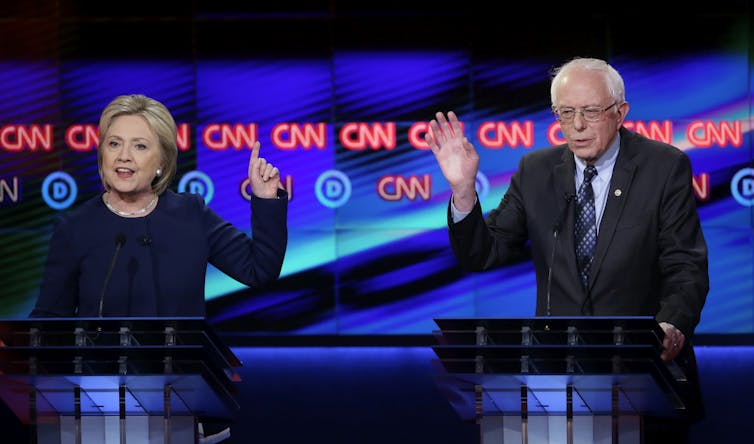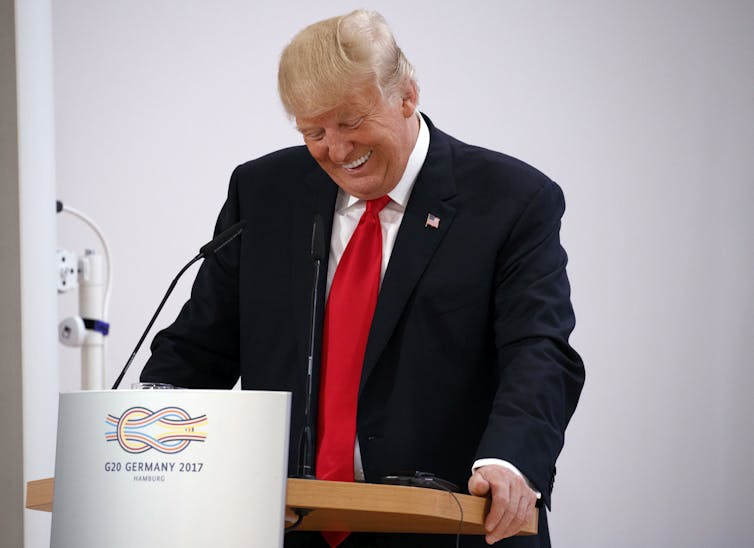Politicians don't seem to laugh at themselves as much anymore
- Written by Frank T. McAndrew, Cornelia H. Dudley Professor of Psychology, Knox College
As the 2020 presidential campaign gets underway, one of the key factors that shapes our perceptions is how the candidates use – or do not use – humor.
One kind of humor that is in shorter supply among politicians than it once was is self-deprecating humor. That’s when politicians make themselves the butt of the joke.
It is unclear exactly why this has become something of a lost art. Perhaps 21st-century politicians need to be more careful and guarded than their predecessors in light of the risks posed by social media[1] and internet news outlets.
Whatever the cause, its decline is striking.
Many past presidents from both parties established a reputation for using self-deprecating humor to great effect. Ronald Reagan deflecting concerns about his age[2] by “refusing to exploit the youth and inexperience of his opponent” during a debate with Walter Mondale in 1984 is a classic. Reagan’s fellow Republican George W. Bush, widely known for his malapropisms, opened the 2005 White House Correspondents’ Dinner by saying,[3] “I look forward to these dinners where I am supposed to be funny … intentionally.”
On the Democratic side, Bill Clinton and Barack Obama frequently peppered their speeches with subtle, humorous self-putdowns and, after leaving office, even Jimmy Carter once quipped[4] about how nice it was that people now used all of their fingers when they waved at him.
In some ways the use of self-deprecating humor by a politician catches people off guard, as it’s expected that a candidate would denigrate their rivals while bragging about themselves[5]. This incongruity grabs our attention and makes the humor more memorable than it might otherwise be, making it an effective political weapon when used strategically.
As a psychologist who studies everyday social life[6], I have seen little self-deprecating humor in recent elections, Hillary Clinton’s forced attempts notwithstanding[7].
Donald Trump and Bernie Sanders, for example, never use it, and one may have to go all the way back to the time of Richard Nixon[8] to experience a political self-deprecation landscape so barren.
 Presidential candidate Hillary Clinton, left, wasn’t good at self-deprecation; presidential candidate Bernie Sanders, right, doesn’t do it at all.
AP/Carlos Osorio[9]
Presidential candidate Hillary Clinton, left, wasn’t good at self-deprecation; presidential candidate Bernie Sanders, right, doesn’t do it at all.
AP/Carlos Osorio[9]
How does self-deprecation work?
Scholars have found that humor is one of the key ways in which humans advertise intelligence, and it makes us more attractive to others[10].
Self-deprecating humor performs other functions as well. For example, it can be used as a strategy to defuse attacks by identifying personal deficiencies before others have a chance to do so.
And there is evidence that it works.
In one recent study[11], some test subjects were shown a short video of David Letterman making fun of New Jersey Gov. Chris Christie when Christie was running for president in 2016[12].
Other people in the study saw a short clip of Christie making fun of himself while appearing as a guest on Letterman’s program.
The people who saw Christie being self-deprecating gave higher evaluations of him than those who heard the same negative information coming from Letterman. They also expressed a greater likelihood of voting for him.
Being comfortable with your weaknesses is an indicator of self-awareness and a sign of confidence and strength. It is a crucial component of the trait of emotional intelligence[13], which means that one is good at maneuvering through the landscape of feelings inherent in every social interaction. There is also evidence that the frequent use of self-mockery can promote psychological well-being[14].
The risks
Self-deprecation does not work equally well for everyone.
It turns out that self-deprecating humor is only effective for high-status people[15] who are already recognized by others as competent and likeable.
If you’re not competent and likeable, self-deprecating humor can backfire. It only serves to reinforce the negative things that people already think[16].
Self-deprecation is especially risky for women[17], who use it more often than men do, but benefit from it much less. It is possible that gender stereotypes about submissiveness and competence[18] prevent this from being an effective female strategy. This may turn out to be a vital piece of information given the large number of female candidates in the Democratic primaries.
Consequently, self-deprecation is best practiced from a position of strength – when you feel confident about your status and believe that this lines up with others’ perceptions of you. In leadership situations, it may be used to forge a secure connection between the leader and the followers. Leaders who are judged to have the quality of transformational leadership – the ability to inspire people to set aside selfish interests for the greater good – are most likely to utilize self-deprecating humor[19].
 President Donald Trump laughs during a 2017 trip to Europe; he rarely, however, laughs at himself.
AP/Evan Vucci[20]
President Donald Trump laughs during a 2017 trip to Europe; he rarely, however, laughs at himself.
AP/Evan Vucci[20]
How to win by spilling coffee
The prerequisite of competence for effective self-deprecation is undoubtedly related to something called “The Pratfall Effect[21],” first identified in a 1966 study by social psychologist Elliot Aronson[22]. He discovered that a person who had already demonstrated competence and superior knowledge in an audition for a TV quiz show actually enhanced his likeability by accidentally spilling a cup of coffee all over himself[23].
A less impressive person who did the same thing ended up with even more negative evaluations.
In short, there are many reasons why a politician may not engage in self-deprecating humor. It is possible that the candidate is simply not adept with humor and avoids it because it does not play to his or her strengths. It is also possible that politicians refrain from self-deprecation because they lack confidence that others think highly of them.
Bernie Sanders is notoriously thin-skinned[24] about the fact that he is a millionaire politician best known for bemoaning the influence of wealthy people in politics. In this situation, an artful touch of self-deprecating humor would probably carry the day more successfully than the testy defensiveness that Sanders usually employs.
This brings us to President Trump.
Many political experts have commented on Trump’s seeming inability to laugh at himself[25]. A display of self-deprecation by the sitting president has become part of the tradition at the annual White House Correspondents’ Dinner; Trump has declined to attend the last three years.
Yet Trump believes that he is a master at self-deprecation, as he believes himself to be a master of so many other things.
Here is what he said[26] at the 2018 annual dinner hosted by the Gridiron Club: “No one does self-deprecating humor better than I do. It’s not even close.”
[ Like what you’ve read? Want more? Sign up for The Conversation’s daily newsletter[27]. ]
References
- ^ risks posed by social media (www.atalanta.co)
- ^ Ronald Reagan deflecting concerns about his age (www.youtube.com)
- ^ opened the 2005 White House Correspondents’ Dinner by saying, (time.com)
- ^ Jimmy Carter once quipped (time.com)
- ^ it’s expected that a candidate would denigrate their rivals while bragging about themselves (www.sciencedirect.com)
- ^ As a psychologist who studies everyday social life (scholar.google.com)
- ^ Hillary Clinton’s forced attempts notwithstanding (www.washingtonpost.com)
- ^ the time of Richard Nixon (www.aspeninstitute.org)
- ^ AP/Carlos Osorio (www.apimages.com)
- ^ advertise intelligence, and it makes us more attractive to others (www.sciencedirect.com)
- ^ In one recent study (www.tandfonline.com)
- ^ Christie was running for president in 2016 (ballotpedia.org)
- ^ It is a crucial component of the trait of emotional intelligence (www.inc.com)
- ^ evidence that the frequent use of self-mockery can promote psychological well-being (www.sciencedaily.com)
- ^ self-deprecating humor is only effective for high-status people (journals.sagepub.com)
- ^ serves to reinforce the negative things that people already think (www.bustle.com)
- ^ Self-deprecation is especially risky for women (www.businessinsider.com)
- ^ possible that gender stereotypes about submissiveness and competence (www.noted.co.nz)
- ^ most likely to utilize self-deprecating humor (www.emeraldinsight.com)
- ^ AP/Evan Vucci (www.apimages.com)
- ^ The Pratfall Effect (www.brescia.edu)
- ^ Elliot Aronson (www.encyclopedia.com)
- ^ enhanced his likeability by accidentally spilling a cup of coffee all over himself (www.brescia.edu)
- ^ Bernie Sanders is notoriously thin-skinned (www.nationalmemo.com)
- ^ Trump’s seeming inability to laugh at himself (www.washingtonpost.com)
- ^ Here is what he said (www.theguardian.com)
- ^ Sign up for The Conversation’s daily newsletter (theconversation.com)
Authors: Frank T. McAndrew, Cornelia H. Dudley Professor of Psychology, Knox College
Read more http://theconversation.com/politicians-dont-seem-to-laugh-at-themselves-as-much-anymore-122103

